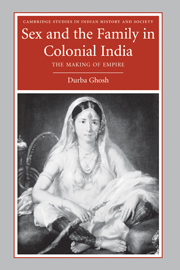Book contents
- Frontmatter
- Contents
- Paintings credits
- Acknowledgments
- Introduction
- 1 Colonial companions
- 2 Residing with begums: William Palmer, James Achilles Kirkpatrick and their “wives”
- 3 Good patriarchs, uncommon families
- 4 Native women, native lives
- 5 Household order and colonial justice
- 6 Servicing military families: family labor, pensions, and orphans
- Conclusion
- Bibliography
- Index
- Miscelloneous Endmatter
3 - Good patriarchs, uncommon families
Published online by Cambridge University Press: 05 August 2014
- Frontmatter
- Contents
- Paintings credits
- Acknowledgments
- Introduction
- 1 Colonial companions
- 2 Residing with begums: William Palmer, James Achilles Kirkpatrick and their “wives”
- 3 Good patriarchs, uncommon families
- 4 Native women, native lives
- 5 Household order and colonial justice
- 6 Servicing military families: family labor, pensions, and orphans
- Conclusion
- Bibliography
- Index
- Miscelloneous Endmatter
Summary
First I do declare and call God to witness that I am married to Punna Purree, a native of Hindostan who since the said marriage is become Punna Purree Pearse and I do firmly believe that our marriage tho' for many years kept secret was in every respect lawfull, and if it were not so I most assuredly would have gone thro' every possible form to have made it so.
Last will and testament of Col. Thomas Pearse, d. 1789When Col. Thomas Deane Pearse, a high-ranking officer in the East India Company died in 1789, his lengthy will left numerous instructions about how he wanted his estate managed after his death. His will and its many codicils supplemented his military memoir, serving as an autobiographical account of his familial attachments. Like many other men, from high-ranking military and civil servants to ordinary merchants and rank-and-file soldiers, Pearse's bequests focused on the household and family he had with a native female companion. In making financial arrangements for their families, British men like Pearse acknowledged their paternal obligations, while remaining savvy about protecting their estates and maintaining their social standing. Negotiating between expressions of familial sentiment while carefully calculating the bequest that each family member deserved, British men were able to act as good patriarchs, providing for their families, and enforcing the household hierarchies that put them at the head of the table.
- Type
- Chapter
- Information
- Sex and the Family in Colonial IndiaThe Making of Empire, pp. 107 - 132Publisher: Cambridge University PressPrint publication year: 2006
- 1
- Cited by



